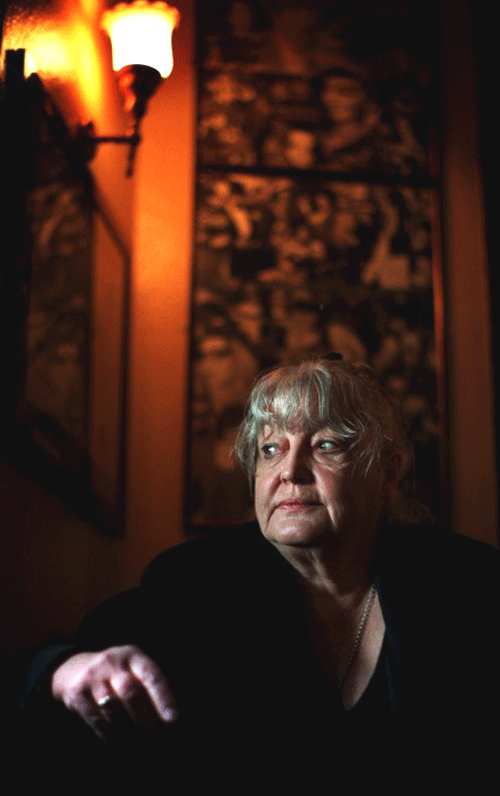Passed/Failed: An education in the life of Erin Pizzey, women's refuge founder and writer
'I was educated to be married'

Your support helps us to tell the story
From reproductive rights to climate change to Big Tech, The Independent is on the ground when the story is developing. Whether it's investigating the financials of Elon Musk's pro-Trump PAC or producing our latest documentary, 'The A Word', which shines a light on the American women fighting for reproductive rights, we know how important it is to parse out the facts from the messaging.
At such a critical moment in US history, we need reporters on the ground. Your donation allows us to keep sending journalists to speak to both sides of the story.
The Independent is trusted by Americans across the entire political spectrum. And unlike many other quality news outlets, we choose not to lock Americans out of our reporting and analysis with paywalls. We believe quality journalism should be available to everyone, paid for by those who can afford it.
Your support makes all the difference.The writer Erin Pizzey, 68, set up the first refuge for battered women in 1971, and now campaigns on behalf of male victims of abuse. Her many books include Scream Quietly or the Neighbours Will Hear, which was turned into a television film
I was born in China. My father was in the Diplomatic Service and posted to Tianjin. We were captured during the Second World War by the Japanese but were very lucky: we were exchanged for Japanese prisoners and put on the last boat out of Shanghai.
We ended up in Kokstad in South Africa. I have memories of walking through the jungle with my twin sister and our black nanny to my first nursery school. When I was five, we joined my father in Beirut, and I went to a Catholic convent. I already spoke English, German and Mandarin, but suddenly had to learn French. There was a big orphanage attached and the children from there sat at the back of the class. Their fingers were terribly pricked because they had to earn their living from embroidering tablecloths and bed linen.
At the end of the war, we went to Canada and joined my godmother in Toronto. At Moulton College I won a prize, the one and only prize I ever won in any school. My mother was very violent, and at her worst during this time. I remember standing in front of a teacher and showing her my legs, which had been whipped with an ironing cord. The teacher virtually said she could do nothing about it.
When I was seven or eight, we joined my father in Tehran, in what was then Persia. There was an American school but I was expelled. My mother found a little English school but one Friday I put a wasp's nest in the teacher's desk and she was stung when she opened it on the Monday. For that and other crimes, I was expelled again.
By this time, I'd learnt to read and saw no reason to go to school. I was reading my way through the books in my parents' bookcase: Walter Scott's novels, and, in particular, a medical dictionary of abnormal diseases and Gray's Anatomy.
We came to England in 1948 and, with my twin sister, I was sent to boarding school at St Antony's, the junior school of Leweston Manor in Sherborne, Dorset. I was very happy in the holidays when we stayed at St Mary's, a big old house with 240 acres. Miss Williams, who ran it, was my mentor and let me browse through her books.
At 11, we moved up to the senior school run by Mother Eleanor, a vicious, evil woman. I was punished because nobody realised I was severely dyslexic. She couldn't expel me because my parents, back in Tianjin, were captured by the Communists and put under house arrest. My sister and I thought they were dead. Admittedly, I must have been an absolute nightmare. I took pride in being bottom. I had to sit outside the refectory, eating on my own, and every playtime I was sent to the library to study.
A supply teacher once held up an essay of mine and said that I could be a writer. But we were educated to be married: we spent a lot of time learning how to darn our future husband's socks so that he didn't get blisters. At the end, I was surprised to get four O-levels.
My parents were posted to Africa and my mother enrolled us, at 16, at Dakar University, to study French and English. Most of the students were men who had been educated in Russia. I ended up leading a demonstration; my French wasn't sufficiently sophisticated to realise that it was organised by the Communist Party – and my father was the acting consul general.
At 18, I spent a miserable year at a secretarial school in Devon, then joined my parents in Macao and joined MI6 in Hong Kong. It was all very Graham Greene, but I didn't last long. I discovered alcohol and men.
Join our commenting forum
Join thought-provoking conversations, follow other Independent readers and see their replies
Comments